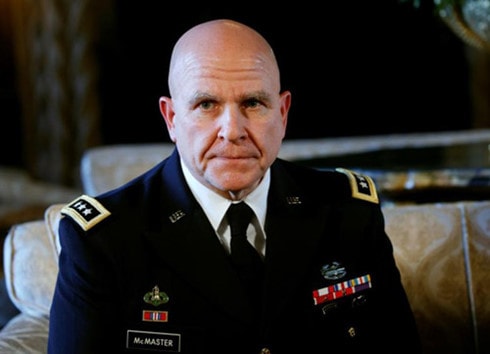Is the new US national security advisor different from Mr. Trump in his views on Russia?
US President Trump and new national security adviser McMaster have inconsistent approaches to Russia and some other defense policies.
US President Donald Trump has often shown that he has little patience for those with opposing views, but he seems to want to test this weakness through his choice of Lieutenant General HR McMaster, 54, a military strategist, as the new national security adviser to replace Mr. Michael Flynn.
McMaster joins the White House team with views on Russia, the fight against terrorism, the military buildup and core security issues that are quite different from those of the US President's loyalists and what Mr. Trump has expressed.
McMaster is highly regarded for his career in the US armed forces, including serving in Iraq and Afghanistan. He is currently the director of the military’s Capabilities Integration Center, an agency tasked with bringing “combat capabilities to the force” and other government agencies.
Mr. McMaster is described as a military strategist whose ideas are shaped by experience rather than emotion, by battlefield realities more than political intentions.
McMaster, however, will not be alone. His prominent political allies include: Secretary of Defense Jim Mattis; Chairman of the Joint Chiefs of Staff, General Joseph Dunford; and Senator John McCain, Chairman of the Senate Armed Services Committee, along with many soldiers who have fought alongside or under him over the years.
White House press secretary Sean Spicer said on February 21 that President Trump told McMaster that “he has full authority to structure the national security team the way he wants.”
However, in a move that is considered “unusual”, Mr. Trump has brought Steve Bannon, the President’s chief strategic advisor, who brings right-wing ideology to the White House National Security Council. This is said to cause many obstacles to McMaster’s work.
Commenting on the steps taken by Mr. Trump to build his government, Andrew Exum, a former military officer and Middle East policy researcher at the US Department of Defense, said that the potential risk of controversy in Trump's policies was partly due to Steve Bannon's fault for advising on bringing inappropriate people into the country's leadership.
The difficult problem of radical Islam
One of the first challenges Mr. McMaster faces in asserting his influence is reviewing U.S. policy in Syria and the broader fight against radical Islam.
In late June 2016, Bannon declared that the US and its allies in Europe were engaged in a “global existential” war against Islam.
 |
| Lieutenant General HR McMaster |
In 2003, McMaster participated in the Iraq war. He was praised for commanding American soldiers to protect the city of Tal Afar from attacks from insurgents.
McMaster played a key role in developing the military's counterinsurgency doctrine under General David Petraeus. McMaster served as special assistant to General Petraeus during his command of US forces in Iraq from 2007 to 2008.
In 2010, McMaster continued to the battlefield in Afghanistan, assigned to oversee military plans and fight corruption.
Perhaps it was because of this experience that McMaster told his troops never to call Iraqis “hajjis” – a slang term many Americans use to insult Muslim pilgrims to Mecca.
In the Military Review, Mr. McMaster warned that increasing the force as Mr. Trump has done, as he pledged to do, to bomb and “blow away” the self-proclaimed Islamic State (IS) militants, could be counterproductive.
“In Iraq, ignorance about the local, ethnic, and religious dynamics of conflicts… sometimes leads to military actions (such as strikes against suspected hostile networks). These clashes exacerbate fear and outrage among civilians, which in turn invigorate insurgents,” McMaster wrote.
McMaster was right to be cautious about using force, having seen 21 US soldiers killed in the battle of Tal Afar, Iraq, and one unit suffered 40% casualties in the battle.
The Russian test
Mr. McMaster’s second test is his policy toward Russia. Unlike his predecessor, Michael Flynn, and President Trump, Mr. McMaster views Moscow as an adversary, not a potential partner.
In May 2016, in a speech at the Center for Strategic and International Studies (CSIS), Mr. McMaster pointed out that Russia's annexation of Crimea and support for opposition forces in Eastern Ukraine was evidence of an effort to "collapse the post-World War II, post-Cold War world order, disrupt stability, security, economics and politics in Europe and the ultimate goal is to bring more benefits to Russia."
According to a website that provides information about Mr. Trump’s campaign activities, he has promised to add “tens of thousands of troops, expand the Navy fleet from 282 ships to 350 and provide the Air Force with 1,200 fighter jets.”
Mr. McMaster seems to have a completely different view when he wrote in the Military Review magazine that: “Promising victory based solely on better intelligence and more precise strike capabilities” is a fallacy for “misleading in outlining strategies to destroy enemy organizations.”
According to experts, the question is whether Mr. McMaster has enough resources to change the policy that the US President and his closest aides have outlined.
“I think the real challenge he is going to face is not the strategy or the global responsibilities of being the world's only power. He knows how to deal with those.
“Mr. McMaster’s real challenge is the moral issue of dealing with an administration that has not always been clear about its support for American values,” said John Nagl, a retired colonel who helped rewrite the US counterinsurgency doctrine for the wars in Iraq and Afghanistan./.
According to VOV
| RELATED NEWS |
|---|

